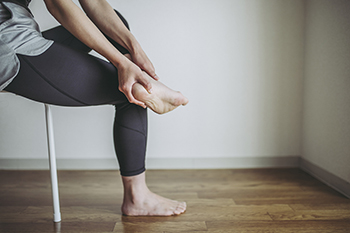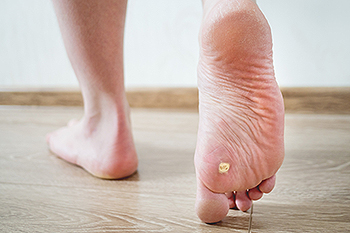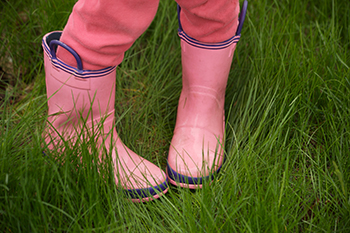Items filtered by date: December 2023
Unraveling the Mysteries Behind the Agony of Heel Pain

Heel pain is a common grievance that can impact people of all ages and lifestyles. To understand why it afflicts so many, it is essential to delve into its multifaceted causes. One of the primary culprits is plantar fasciitis, where the tissue connecting the heel to the toes becomes inflamed due to excessive strain, often stemming from prolonged standing, or from wearing improper footwear. Another common source of heel pain is Achilles tendonitis, an overuse injury affecting the tendon at the back of the heel, which can result from intense physical activities and inadequate rest. Heel spurs, small calcium deposits on the heel bone, can also trigger discomfort, often linked to conditions like plantar fasciitis. Additionally, various systemic diseases, such as arthritis, can manifest as heel pain. If you have heel pain for any reason, it is suggested that you visit a podiatrist who can determine what that cause is, and offer treatment options that are right for you.
Many people suffer from bouts of heel pain. For more information, contact one of our podiatrists of Pennsylvania. Our doctors can provide the care you need to keep you pain-free and on your feet.
Causes of Heel Pain
Heel pain is often associated with plantar fasciitis. The plantar fascia is a band of tissues that extends along the bottom of the foot. A rip or tear in this ligament can cause inflammation of the tissue.
Achilles tendonitis is another cause of heel pain. Inflammation of the Achilles tendon will cause pain from fractures and muscle tearing. Lack of flexibility is also another symptom.
Heel spurs are another cause of pain. When the tissues of the plantar fascia undergo a great deal of stress, it can lead to ligament separation from the heel bone, causing heel spurs.
Why Might Heel Pain Occur?
- Wearing ill-fitting shoes
- Wearing non-supportive shoes
- Weight change
- Excessive running
Treatments
Heel pain should be treated as soon as possible for immediate results. Keeping your feet in a stress-free environment will help. If you suffer from Achilles tendonitis or plantar fasciitis, applying ice will reduce the swelling. Stretching before an exercise like running will help the muscles. Using all these tips will help make heel pain a condition of the past.
If you have any questions please contact one of our offices located in Plymouth Meeting and Ambler, PA . We offer the newest diagnostic and treatment technologies for all your foot and ankle needs.
The Growth of Plantar Warts on the Feet

Plantar warts, though usually harmless, can be quite bothersome. These skin growths typically appear on the soles of your feet and can be painful, especially when walking. They are caused by a virus that accelerates the growth of the top layer of skin, resulting in the formation of warts. While plantar warts generally disappear on their own over months or even years, they can be a source of discomfort and concern. These warts are extremely contagious and can spread easily. Not only can you re-infect yourself by touching a wart and then another part of your body, but you can also transmit the virus to others by sharing personal items, like towels or socks. In most cases, plantar warts do not require treatment. However, if they cause you pain or multiply, it is suggested that you schedule an appointment with a podiatrist for an accurate diagnosis and treatment.
Plantar warts can be very uncomfortable. If you need your feet checked, contact one of our podiatrists from Pennsylvania. Our doctors will assist you with all of your foot and ankle needs.
About Plantar Warts
Plantar warts are the result of HPV, or human papillomavirus, getting into open wounds on the feet. They are mostly found on the heels or balls of the feet.
While plantar warts are generally harmless, those experiencing excessive pain or those suffering from diabetes or a compromised immune system require immediate medical care. Plantar warts are easily diagnosed, usually through scraping off a bit of rough skin or by getting a biopsy.
Symptoms
- Lesions on the bottom of your feet, usually rough and grainy
- Hard or thick callused spots
- Wart seeds, which are small clotted blood vessels that look like little black spots
- Pain, discomfort, or tenderness of your feet when walking or standing
Treatment
- Freezing
- Electric tool removal
- Laser Treatment
- Topical Creams (prescription only)
- Over-the-counter medications
To help prevent developing plantar warts, avoid walking barefoot over abrasive surfaces that can cause cuts or wounds for HPV to get into. Avoiding direct contact with other warts, as well as not picking or rubbing existing warts, can help prevent the further spread of plantar warts. However, if you think you have developed plantar warts, speak to your podiatrist. He or she can diagnose the warts on your feet and recommend the appropriate treatment options.
If you have any questions please feel free to contact one of our offices located in Plymouth Meeting and Ambler, PA . We offer the newest diagnostic and treatment technologies for all your foot and ankle needs.
Foot Care Practices for Distance Runners

Taking care of your feet as a runner is essential for a comfortable and injury-free experience. Start by carefully choosing your gear, especially your footwear, to prevent running injuries. Ensure a snug fit around the heel and instep to prevent friction and blisters, while leaving enough space in the toe box to accommodate downhill running and avoid bruised toenails. Choose moisture-wicking, anti-blister socks, and combine them with anti-chafe or diaper cream for lasting protection during long runs. While running, be attentive to any discomfort and take a brief pause to shake out your shoes, preventing hot spots and blisters. Consider using gaiters to shield your feet from external elements and eliminate the need for mid-run shoe cleanouts. Keep your toenails trimmed, moisturize your feet regularly, and use baby powder to keep them fresh and dry. Additionally, file down calluses to maintain a balance that prevents cracking and potential infections. Incorporate foot exercises such as the towel scrunch and resistance band calf stretch to prevent conditions like plantar fasciitis. It is suggested that you consult a podiatrist promptly if you notice any changes in your toenails or experience foot or ankle discomfort.
All runners should take extra precaution when trying to avoid injury. If you have any concerns about your feet, contact one of our podiatrists of Pennsylvania. Our doctors will treat your foot and ankle needs.
How to Prevent Running Injuries
There are a lot of mistakes a runner can make prior to a workout that can induce injury. A lot of athletes tend to overstretch before running, instead of saving those workouts for a post-run routine. Deep lunges and hand-to-toe hamstring pulls should be performed after a workout instead of during a warmup. Another common mistake is jumping into an intense routine before your body is physically prepared for it. You should try to ease your way into long-distance running instead of forcing yourself to rush into it.
More Tips for Preventing Injury
- Incorporate Strength Training into Workouts - This will help improve the body’s overall athleticism
- Improve and Maintain Your Flexibility – Stretching everyday will help improve overall performance
- “Warm Up” Before Running and “Cool Down” Afterward – A warm up of 5-10 minutes helps get rid of lactic acid in the muscles and prevents delayed muscle soreness
- Cross-Training is Crucial
- Wear Proper Running Shoes
- Have a Formal Gait Analysis – Poor biomechanics can easily cause injury
If you have any questions, please feel free to contact one of our offices located in Plymouth Meeting and Ambler, PA . We offer the newest diagnostic and treatment technologies for all your foot care needs.
Reminder: When Was the Last Time...?
Treating Your Child’s In-Toeing

Most people's feet typically point straight ahead or outward, but some children develop a condition known as in-toeing, where the feet point inward which is often referred to as pigeon toes. In-toeing is a common phenomenon in young children, and while it often corrects itself with time, some cases require attention and treatment, based on the underlying cause. Internal tibial torsion is one cause of in-toeing, and most doctors refrain from prescribing treatment for young children with this condition. Braces and special shoes are generally ineffective and rarely used due to their expense and children's reluctance to wear them. Surgical correction is only considered in cases where the twist in the tibia is severe and appearance becomes a concern. Excess femoral anteversion, another cause of in-toeing, typically improves on its own as children age. Braces or shoe modifications are generally not effective, and surgery is only considered in very severe cases where the inward twist of the thigh bone is significant. Metatarsus adductus, characterized by a curved foot shape, may involve stretching exercises or the use of casts or braces for more severe cases. Fortunately, any residual curvature post-treatment does not impede a child's ability to run and play, and it is not painful. If your child’s in-toeing seems to be problematic, it is suggested that you schedule an appointment with a podiatrist who can determine what the best treatment is.
The health of a child’s feet is vital to their overall well-being. If you have any questions regarding foot health, contact one of our podiatrists of Pennsylvania. Our doctors can provide the care you need to keep you pain-free and on your feet.
Tips for Keeping Children's Feet Healthy
- Make sure their shoes fit properly
- Look for any signs of in-toeing or out-toeing
- Check to see if they have Clubfoot (condition that affects your child’s foot and ankle, twisting the heel and toes inward) which is one of the most common nonmajor birth defects.
- Lightly cover your baby’s feet (Tight covers may keep your baby from moving their feet freely, and could prevent normal development)
- Allow your toddler to go shoeless (Shoes can be restricting for a young child’s foot)
- Cut toenails straight across to avoid ingrown toenails
- Keep your child’s foot clean and dry
- Cover cuts and scrapes. Wash any scratches with soap and water and cover them with a bandage until they’ve healed.
If you have any questions, please feel free to contact one of our offices located in Plymouth Meeting and Ambler, PA . We offer the newest diagnostic and treatment technologies for all your foot care needs.

